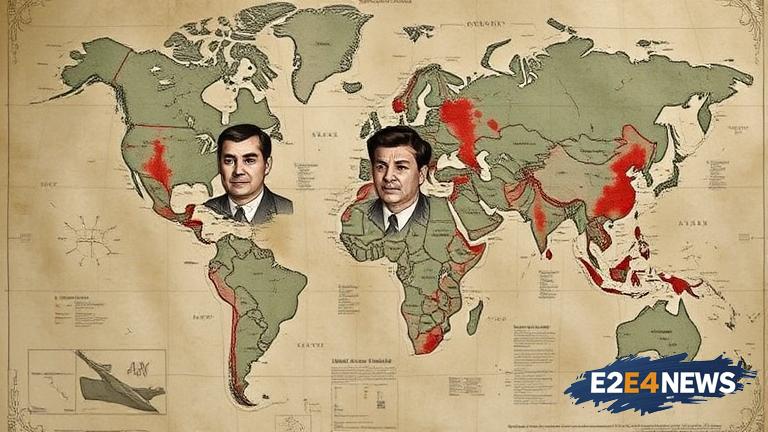The recent US accusation against El Mayo Zambada, the notorious leader of the Sinaloa Cartel, has brought to the forefront the complex and deeply entrenched corruption that has plagued Mexico for decades. The Sinaloa Cartel, one of the most powerful and feared drug trafficking organizations in the world, has been able to maintain its grip on power due in large part to the corrupt relationships it has fostered with high-ranking government officials and law enforcement personnel. El Mayo Zambada, whose real name is Ismael Zambada García, has been at the helm of the cartel since the 1990s and has managed to evade capture despite numerous attempts by Mexican and US authorities to apprehend him. The US accusation against Zambada alleges that he has been involved in a wide range of criminal activities, including drug trafficking, money laundering, and murder. The indictment also highlights the cartel’s use of violence and intimidation to maintain its control over the lucrative drug trade. The Sinaloa Cartel’s rise to power can be attributed in part to the corruption that has permeated all levels of Mexican society, from local police departments to the highest echelons of government. The cartel has been able to bribe and coerce officials into turning a blind eye to its activities, allowing it to operate with relative impunity. The corruption has also enabled the cartel to infiltrate and manipulate the country’s financial systems, allowing it to launder millions of dollars in illicit profits. The US accusation against Zambada is the latest in a long line of efforts by authorities to dismantle the Sinaloa Cartel and bring its leaders to justice. The indictment is based on evidence gathered by US law enforcement agencies, including the DEA and the FBI, which have been working closely with Mexican authorities to build a case against the cartel. The accusation against Zambada is seen as a significant blow to the cartel, which has been able to maintain its power and influence despite the arrest and extradition of several high-ranking members. The Sinaloa Cartel’s influence extends far beyond Mexico’s borders, with the organization having established a significant presence in countries throughout Central and South America, as well as in the United States. The cartel’s ability to corrupt and coerce officials has allowed it to establish a vast network of operatives and associates who are able to facilitate its activities. The US accusation against Zambada has sparked hopes that the cartel’s grip on power may finally be beginning to loosen, and that the Mexican government may be able to make significant strides in its efforts to combat corruption and organized crime. However, the road ahead will be long and difficult, and it will require sustained efforts by authorities on both sides of the border to dismantle the cartel’s complex network of corruption and violence. The Sinaloa Cartel’s history dates back to the 1980s, when it was founded by a group of drug traffickers from the state of Sinaloa. Over the years, the cartel has undergone numerous transformations, with different leaders and factions vying for power and control. Despite these changes, the cartel has managed to maintain its position as one of the most powerful and feared drug trafficking organizations in the world. The cartel’s success can be attributed in part to its ability to adapt and evolve, as well as its willingness to use violence and intimidation to maintain its control over the drug trade. The US accusation against Zambada is the latest in a long line of efforts by authorities to disrupt the cartel’s activities and bring its leaders to justice. The indictment is a significant step forward in the fight against organized crime, and it highlights the importance of international cooperation in combating corruption and drug trafficking. The Sinaloa Cartel’s influence extends far beyond the drug trade, with the organization having established a significant presence in legitimate businesses such as real estate and construction. The cartel’s ability to corrupt and coerce officials has allowed it to establish a vast network of operatives and associates who are able to facilitate its activities. The US accusation against Zambada has sparked hopes that the cartel’s grip on power may finally be beginning to loosen, and that the Mexican government may be able to make significant strides in its efforts to combat corruption and organized crime. The Mexican government has faced significant challenges in its efforts to combat the Sinaloa Cartel, including corruption and violence. The government has implemented a number of strategies aimed at disrupting the cartel’s activities, including the deployment of military personnel to areas where the cartel is known to operate. Despite these efforts, the cartel has managed to maintain its position as one of the most powerful and feared drug trafficking organizations in the world. The US accusation against Zambada is a significant blow to the cartel, and it highlights the importance of international cooperation in combating corruption and drug trafficking. The indictment is based on evidence gathered by US law enforcement agencies, including the DEA and the FBI, which have been working closely with Mexican authorities to build a case against the cartel. The accusation against Zambada is seen as a major step forward in the fight against organized crime, and it has sparked hopes that the cartel’s grip on power may finally be beginning to loosen.
